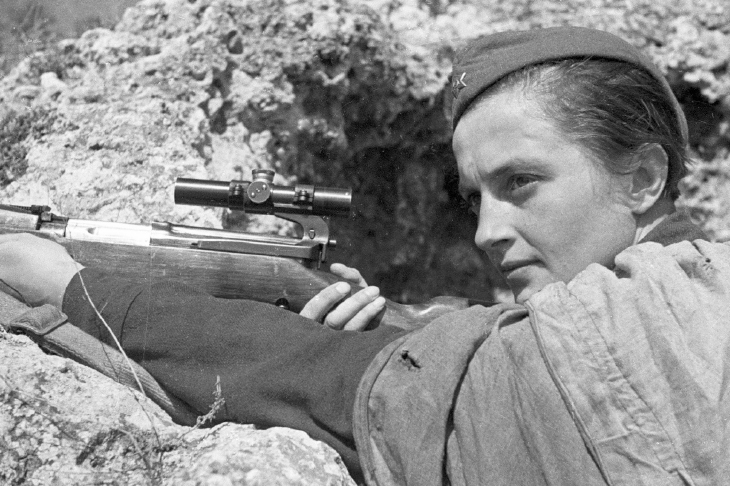Klara Goncharova, a Soviet anti-aircraft gunner, wondered at the end of the second world war how anyone could stand to give birth after learning about Auschwitz and Dachau. But as it turned out, she was already pregnant. Anastasia Voropaeva, a corporal and searchlight operator, recalled a pretty Russian girl in liberated territory who had been raped and impregnated by her German ‘boss’ and had hanged herself after victory rather than give birth to a ‘little Fritz’. Albina Gantimurova remembered nearly shooting an adolescent member of the German Volkssturm in Berlin before he burst into tears and took her hand.
Svetlana Alexievich finished The Unwomanly Face of War, the first of her astonishing oral histories of Soviet life, in 1983. After some interference from censors who accused her of having read too much Remarque and ‘making our victory terrible’, she released it in 1985, the same year Mikhail Gorbachev became General Secretary. Around 800,000 women had served in the war, often as partisans or in medical units, and many had returned home to communities that saw them as damaged goods. ‘Men,’ as Sergeant Valentina Chudaeva put it, ‘didn’t share the victory with us.’ But the book sold two million copies.
Alexievich’s idea for a women’s narrative of the war was rooted in her childhood in the postwar Belorussian countryside, which she described in her 2015 Nobel lecture as a place of women without men. Although her father, a loyal communist, had fought in and survived the war, most of her impressions of the 1941 German invasion had come from the memories of the women it had left alone. Drawing on that background, Alexievich advances some roughhewn theses about how men and women perceive war differently: men, she says, ‘hide behind history’ and focus on conflicts of ideas and interests; women are ‘caught up with feelings’ and ‘capable of seeing what is closed to men’.
While the latter quote rings true, Alexievich’s narrative seems not to be built upon feelings in general so much as on maternal feelings, or at least the broader question of maternity. This encompasses the reluctance of Soviet recruiters to send patriotic young virgins — many just 17 — to the front; the protective feelings the young women felt towards wounded male comrades and even German prisoners; anxieties over what the war would do to their postwar marriage and family prospects; the grim dilemma of pregnancy at the front; even the question of what the hell kind of sons German mothers had raised.
There is also the related question of male prejudices against female soldiering, although most Russian men at the front appear to have admired the enlisted women and to have treated them well. There was, in any case, a degree of ideological support for the idea, since women had participated in the Russian Revolution and the ensuing civil war, and the generation that had grown up in the 1930s and early 1940s was used to slogans such as ‘Girls — at the wheel of the tractors!’ and ‘Girls — at the controls of a plane!’ But the atmosphere of total war against dark fascist forces provided one logic, and the prospect of victory another. It boiled down to ‘don’t become coarse’ and ‘men will be afraid to marry you’.
The question of how the genders differ is rather more contested today than it was in 1983, but Alexievich is unfussed on the point: war, she writes, is a product of men’s nature; young women at war clung to cherished vestiges of femininity so as ‘not to betray their nature’. Her interviewees, in any case, do present war in ways this reviewer has never encountered before. One recurring component is an acute sensitivity to how war affects animals. ‘How could those people do such things in front of horses?’ one former partisan says of the way the Germans had mutilated a group of her comrades in front of their mounts. There is also a special genre of simile: readers will likely not forget Maria Bozhok, the nurse who likened quietly carrying away soldiers’ amputated limbs to carrying babies.
Alexievich remarks in her introduction that, during each of her interviews, there were always three women present: ‘the one who is talking now, the one she was then… and myself.’ Women in the second category often said things like, ‘Nowadays we can talk about everything’ or, ‘Are you allowed to write about these things? Before you weren’t…’ It is tempting to think of Alexievich’s rugged heroines as having participated in the birth of glasnost and perestroika. But it is also worth observing that some of them remained Stalinists, while others, having survived the hell of Russia’s Great Patriotic War, abjured family life throughout the Cold War in case Mother Russia needed them to bear arms again.






Comments